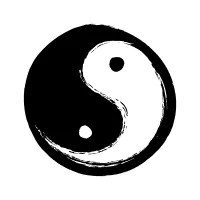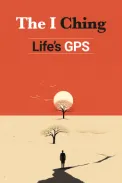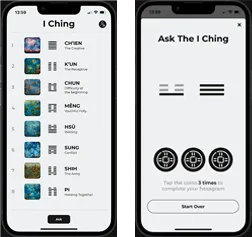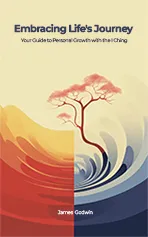
How to Consult the I Ching: Your Step-by-Step Guide
Embark on a journey of wisdom and self-discovery with the ancient practice of consulting the I Ching, using either traditional three coins or our innovative app. This article offers a comprehensive guide into the world of I Ching divination, meticulously detailing the step-by-step process and the profound interpretations that each coin toss or app selection reveals. Whether you're seeking advice for specific concerns, general guidance, or daily inspiration, the I Ching stands as a timeless source of wisdom. This guide is designed to cater to both seasoned practitioners and curious newcomers, emphasising the importance of approaching the I Ching with an open mind and a respectful heart. By doing so, you ensure a deeply insightful experience that resonates with personal growth and understanding, irrespective of how frequently you consult this ancient and venerable text.
Meet the Sage
Throughout your consultation with the I Ching, you'll often come across references to 'the Sage.' This terminology can correspond to 'God,' 'Allah,' 'my higher self,' 'the universe,' or any term you resonate with, depending on your personal beliefs. Feel free to replace these references with a term that best suits your comfort. Read on further for our I Ching how to.
How to Consult I Ching using the App
A hexagram in the I Ching consists of six lines. Each hexagram starts from the bottom, with line 1, progressively moving up to line 6 at the top. These lines can either change or remain constant. Our I Ching AI app, based on the I Ching coin method, will randomly generate these six lines. For example, consider the following Hexagram:

1st line is closed, 2nd is open but is grey, which means it is a changing line, 3rd line is closed, 4th line is open, 5th line is closed but also grey and is a changing line, and the 6th is closed.
This combination makes up Hexagram 63. By clicking on the Hexagram, the app will take you to the meanings and interpretations of Hexagram 63. Please read all the passages and their associated lines. In this case, the app will display lines 2 and 5. You will read these for additional guidance.
Since there are changing lines, we convert this Hexagram to its opposite. Read the text of the second Hexagram to illuminate the instruction of the first Hexagram. In this case, we change lines 2 to closed and 5 to open. This combination produces hexagram 11.

How to use the I Ching with Coins
While technology has revolutionised the way we interact with ancient wisdom like the I Ching, there's a unique and enriching value in embracing the traditional practices that these texts originate from. One such practice is the coin method of casting hexagrams, a physical act that has been part of I Ching divination for centuries.
Using the coin method to consult the I Ching is about more than just casting hexagrams—it's a ceremonial practice that connects us with the rich history and cultural context of the I Ching. Each coin toss is a tactile and mindful act, grounding us in the present moment. This immersion in the process helps foster a stronger connection to the wisdom of the I Ching. It can deepen our understanding of the hexagrams as we physically engage in their creation, enhancing the sense of personal relevance and making the teachings of the I Ching feel even more applicable to our lives.
Step 1 Toss three coins with a shake of your cupped hands, and let them fall.
Step 2 Count heads as three and tails as two, and add the value of all three coins.
- Three heads equals 9
- Two heads and one tail equals 8
- One head and two tails equals 7
- Three tails equals 6
Step 3 Generate the second line of your Hexagram by giving the coins another toss. Then, place this line above the initial line.
Step 4 Continue the process until you have 6 lines.
Step 5 As an example, let's assume the following was rolled.

Note 6 and 9 are changing lines. Even numbers 6,8 are drawn as open. Odd numbers 7,9 are drawn as closed.
Step 6 Determine your Hexagram by cross-referencing with the hexagram key. The bottom trio of lines forms the lower trigram, while the upper trio constitutes the upper trigram. The Hexagram can be identified by the number where the lower and upper trigrams intersect. In this case it is Hexagram 63.

Step 7 Read the text for that Hexagram up to the section that says 'First Line.' Beyond that, read only the sections for those lines which 'changed' in your Hexagram. Changing lines are those with a value of 6 or 9. In the example above, lines 2 and 5 are changing lines.

Step 8 Now that you've read the Hexagram's meaning and corresponding changing lines, it's time to switch them to their counterparts.
Step 9 In the above example, line 2 now becomes closed, and line 5 becomes open. Using the hexagram key, locate where the new lower and upper trigram intersect—this forms Hexagram 11.

Step 10 To enhance the understanding of the initial Hexagram, delve into the text of the second Hexagram. Remember to concentrate only on the introductory sections. Avoid reading the text for any lines, and ignore lines 1 to 6. The focus is exclusively on the appropriate lines in the first Hexagram.
Whether you prefer the traditional coin method or the convenience of an app to consult the I Ching online, this guide is designed to facilitate your journey towards understanding and applying the wisdom of the I Ching. Whether you refer to it as 'i ching consult,' 'i ching consultation,' or 'consulting the i ching,' the process remains a transformative practice aimed at enhancing self-awareness and personal growth. So, let's embark on this enriching journey together!
How to read i ching / consult I Ching online you can start here begin using the I Ching
The Philosophical and Spiritual Foundations of the I Ching
At the heart of consulting the I Ching, or the Book of Changes, lies a rich tapestry of philosophical and spiritual concepts that have guided seekers for millennia. Central to its philosophy is the interplay of yin and yang, ancient Chinese principles representing the dualistic nature of reality. Yin and yang are not static; they are dynamic, constantly interacting forces that maintain the universe's balance. In the context of the I Ching, each hexagram is a unique configuration of yin (broken lines) and yang (solid lines), offering insights into the ever-changing flow of life. When you consult the I Ching, especially using the traditional method of three coins, you engage with this ancient understanding of the cosmos. The act of tossing the coins six times to form a hexagram symbolises the dance of yin and yang, providing a mirror to the querent's current situation in the vast tapestry of existence.
The I Ching also embodies the Taoist concept of change and impermanence, integral to understanding the nature of our existence. The Tao, or 'The Way', is seen as the ultimate truth governing all things. In the practice of I Ching divination, this is reflected in the dynamic nature of the hexagrams, where each line can be unchanging or changing (yin or yang), indicating a state of flux. This idea teaches us to embrace change as a natural and inevitable part of life. When you consult the I Ching using three coins, whether through a step-by-step guide or an online I Ching tool, you're not just seeking answers; you're engaging with an ancient system that views life as a continuous process of transformation. Each reading, each hexagram from the bottom line to the top, is a moment captured in this eternal flow, offering guidance, wisdom, and a deeper understanding of the yin and yang within and around us.
Interpreting the I Ching: Beyond the Basics
Delving deeper into interpreting the I Ching, beyond the fundamental understanding of hexagrams and lines, reveals a profound layer of wisdom that can be applied to complex life situations and personal growth. When you consult the I Ching using three coins, each toss is not just a random act; it's a conversation with the ancient wisdom of the Book of Changes. This ancient Chinese text, rich in philosophical depth, offers more than just divinatory guidance; it provides a reflective mirror to our innermost questions. Understanding the nuances of yin and yang, the broken and unbroken lines, and the changing lines within each hexagram requires an open mind and a contemplative approach. Whether you're using a step-by-step guide or consulting the I Ching online, the key is to see beyond the immediate interpretation of the hexagram. Each line, from the first line to the sixth, holds a message pertinent not only to the question at hand but also to the broader context of your life's journey. In this way, consulting the I Ching becomes a transformative practice, guiding personal growth and deepening self-awareness.
The process of divination with the I Ching, especially through the traditional method of tossing the coins six times, offers a unique opportunity to engage with the timeless teachings of the yi. As you cast the coins and consult the text, consider not only the literal interpretations but also the symbolic meanings behind each hexagram and line. The Book of Changes encourages us to view life's challenges and opportunities through a lens of change and impermanence, reminding us that each moment is a step in our ongoing journey of transformation. By consulting the I Ching with an open mind and a reflective heart, you can unlock deeper insights and wisdom, applying the ancient teachings to contemporary dilemmas and personal evolution. Whether you encounter a hexagram with changing yin or unchanging yang lines, each reading is a step towards greater understanding and harmony with the flux of life.
Common Misconceptions and Challenges in Consulting the I Ching
A frequent misconception about consulting the I Ching is that it serves as a tool for fortune-telling or predicting the future. In reality, the I Ching, or the Book of Changes, is not a crystal ball but a profound source of wisdom that helps in understanding the present moment and its possibilities. Its purpose is to offer guidance, illuminating the path of self-awareness and decision-making based on the present circumstances. Another common misunderstanding is the oversimplification of the yin and yang principles, often seen merely as binary opposites. The I Ching's philosophy, however, teaches that these forces are interdependent and constantly in flux, reflecting the dynamic nature of life itself. When consulting the I Ching, whether using traditional three coins or an online version, it's crucial to approach with an open mind and a readiness to engage with the text's deeper philosophical aspects, rather than seeking definitive answers or simple binaries.
Addressing the challenges in I Ching consultations, one major hurdle is interpreting the hexagrams and lines correctly. The I Ching is rich with symbolic language and metaphor, requiring contemplation and introspection for meaningful interpretation. For those new to the I Ching, the sheer complexity of its system—64 hexagrams, each with six potential lines that could be changing or unchanging—can be daunting. To overcome this, it's beneficial to study the foundational concepts of the I Ching and gradually develop a personal connection with its teachings. Regular practice and patience are key, as is maintaining a journal of consultations to reflect on the evolution of your understanding over time. Remember, consulting the I Ching is a journey of personal growth, not just a method for divination, and embracing its wisdom can lead to profound insights and transformation.
Ethical Considerations in Using the I Ching
When engaging with the I Ching for divination, it's important to approach it with a sense of respect and ethical integrity. The I Ching, or Book of Changes, is not just a divinatory tool but a sacred text that has held spiritual significance for millennia. It should be approached with the same reverence one would accord to any profound spiritual or philosophical work. Ethically, this means avoiding using the I Ching for trivial or selfish purposes, such as gambling or manipulating others. The primary purpose of consulting the I Ching should be for personal growth, understanding, and insight into life's complex situations. This respectful approach honours the ancient wisdom of the text and aligns with the ethical principles inherent in its teachings, such as harmony, balance, and the interconnectivity of all things.
Furthermore, it’s crucial to understand that the I Ching's guidance is not deterministic or absolute. Interpreting its wisdom as a definitive prediction of future events or as an infallible solution to problems can be ethically problematic and contrary to the I Ching's philosophical essence. The ethical use of the I Ching involves viewing it as a guide that provides perspectives and reflections, helping to illuminate various aspects of a situation rather than dictating a specific course of action. This approach encourages personal responsibility and ethical decision-making, allowing individuals to consider the moral implications of their choices. In summary, using the I Ching ethically means engaging with it thoughtfully, responsibly, and with a deep appreciation for the ancient wisdom it offers.
Personal Reflections and Journaling
Maintaining a journal of your I Ching consultations offers a powerful tool for personal growth and reflection. By recording each consultation, including the date, the question posed, the hexagram(s) received, and your initial interpretations, you create a personal archive of wisdom and insight. This practice allows you to track patterns and themes that emerge over time, providing a deeper understanding of the I Ching's guidance in your life. Journaling your consultations is not merely about recording outcomes; it's about capturing your thoughts, emotions, and reflections at the moment. This introspective process can reveal how your perceptions and understanding of the I Ching's teachings evolve. It also serves as a meditative exercise, helping you connect more deeply with the philosophical and spiritual foundations of the I Ching, and enables you to see how its wisdom applies to your daily life and personal journey.
As you revisit your journal entries over time, you may discover new layers of meaning in past readings that were not apparent initially. This ongoing dialogue with the I Ching, enhanced by personal journaling, allows for a more profound and nuanced engagement with the text. It turns the act of consulting the I Ching into a reflective practice, fostering a deeper connection with your inner wisdom and the timeless teachings of the Book of Changes. Whether you're consulting the I Ching using traditional three coins, yarrow sticks, or an online tool, the act of journaling enriches the experience, transforming each consultation into a step on the path of self-discovery and personal enlightenment.
Useful Links
- What is the I Ching
- History of the I Ching
- How to consult the I Ching
- Consult the I Ching Online
- Access all the I Ching Hexagrams 1 to 64
- Buy the book, Embracing Life’s Journey Your Guide to Personal Growth with the I Ching
- Discover Inner Peace, one day at a time
The Wisdom of Change: A Mirror for Your Clarity

A Companion for Navigating Change with Presence
A somatic mirror for the soul. Use the ancient logic of the Tao to dissolve the noise of pressure and return to the insight you already possess. Clarity is not found—it is remembered.


